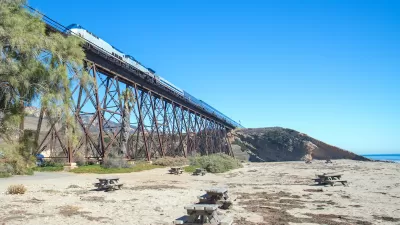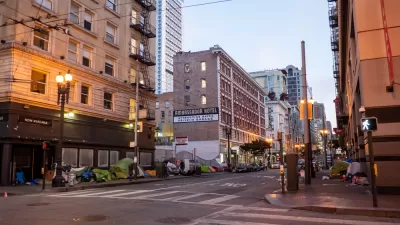California Watch, a project of the nonprofit Center for Investigative Reporting, evaluated the 2009-11 American Community Survey and determined that CA's 'drive-alone' rate to work was 73%. Joanna Lin points the finger at free parking as chief cause.
To be sure, California Watch did not rate reasons for solo commuting - Lin only explores the 'free parking' explanation by interviewing UCLA Professor Don Shoup. Clearly a major reason would be the time benefit as well - as in all California counties, solo commuting was quicker than carpooling or public transit. Lin doesn't include data for walking or biking. Commute modes and times for all 58 California counties are included in the study. Guess which county had the lowest drive-alone rate?
"Californians who refrain from driving to work alone typically have longer commutes. On average, solo drivers spent 25 1/2 minutes getting to work, the census survey showed. Carpoolers took just over half an hour to get to their jobs, and public transit riders commuted nearly 47 minutes to work."
Shoup points to free parking at work.
"One explanation for persistently high rates of solo drivers, said Donald Shoup, a professor of urban planning at UCLA, is free parking."
"If you can park free at work, it's an invitation to drive to work alone. And almost everybody who does drive to work has this invitation," he said.
"A study Shoup conducted 15 years ago for the state Air Resources Board found that employers who offered cash-out programs saw solo driving to work drop by 17 percent, carpooling increase by 64 percent, walking and biking grow by 33 percent, and transit ridership jump by 50 percent.
The cash-out program, however, is not well known and not widely used, Shoup said.
San Francisco residents were the least likely in the state to commute by driving alone, with 37.5 percent who did. One in 5 reported having no vehicles available to them, a much higher rate than the statewide average of 3.6 percent.
By contrast, in Los Angeles County, the 7.2 percent of residents who rode public transit to work commuted an average of nearly 48 minutes (compared to San Francisco's 37.3 minutes). Driving alone to work took Los Angeles residents an average of 27.4 minutes."
In the California Watch article on the survey, Lin notes that "Californians' commuting habits have not changed much in recent years. They drive, carpool and ride public transit at about the same rates they reported in the 2006-8 American Community Survey, and their journeys to work are about the same duration."
Thanks to Len Conly
FULL STORY: Free work parking drives solo driver rate

Planetizen Federal Action Tracker
A weekly monitor of how Trump’s orders and actions are impacting planners and planning in America.

Maui's Vacation Rental Debate Turns Ugly
Verbal attacks, misinformation campaigns and fistfights plague a high-stakes debate to convert thousands of vacation rentals into long-term housing.

Restaurant Patios Were a Pandemic Win — Why Were They so Hard to Keep?
Social distancing requirements and changes in travel patterns prompted cities to pilot new uses for street and sidewalk space. Then it got complicated.

In California Battle of Housing vs. Environment, Housing Just Won
A new state law significantly limits the power of CEQA, an environmental review law that served as a powerful tool for blocking new development.

Boulder Eliminates Parking Minimums Citywide
Officials estimate the cost of building a single underground parking space at up to $100,000.

Orange County, Florida Adopts Largest US “Sprawl Repair” Code
The ‘Orange Code’ seeks to rectify decades of sprawl-inducing, car-oriented development.
Urban Design for Planners 1: Software Tools
This six-course series explores essential urban design concepts using open source software and equips planners with the tools they need to participate fully in the urban design process.
Planning for Universal Design
Learn the tools for implementing Universal Design in planning regulations.
Heyer Gruel & Associates PA
JM Goldson LLC
Custer County Colorado
City of Camden Redevelopment Agency
City of Astoria
Transportation Research & Education Center (TREC) at Portland State University
Jefferson Parish Government
Camden Redevelopment Agency
City of Claremont





























